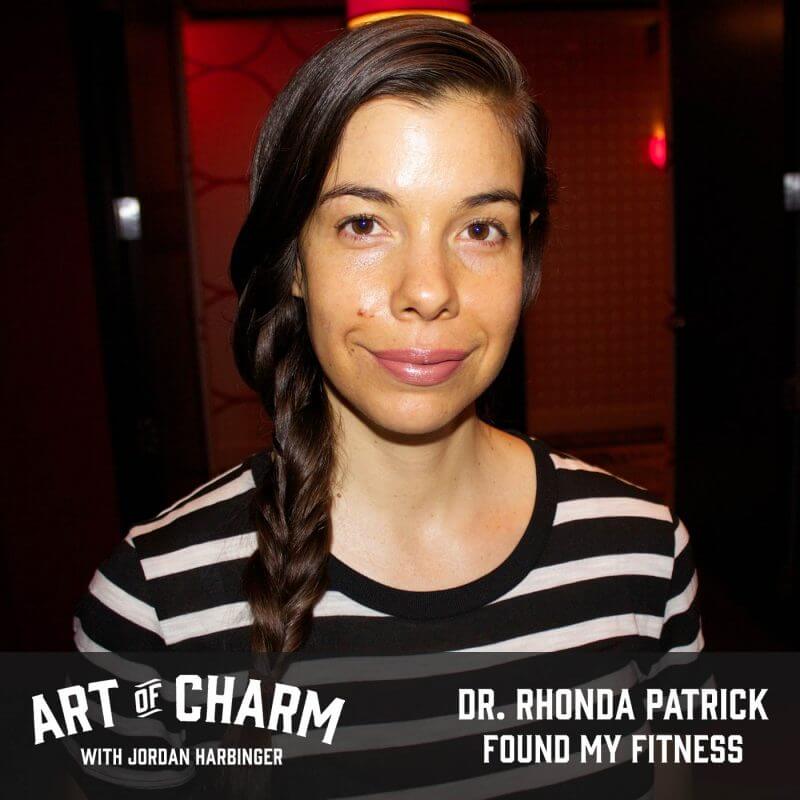Dr. Rhonda Patrick (@foundmyfitness) of Found My Fitness talks about micronutrient deficiencies on metabolism, inflammation, DNA damage, and aging as well as the role of vitamin D and omega-3 fatty acids in brain function.
The Cheat Sheet:
- Just because you don’t have scurvy doesn’t mean you’re getting all the vitamins and minerals your body needs.
- Genetics get credited (or blamed) for cognitive function when what we eat and how we live have just as much (or more) impact.
- How does stress affect your capacity to learn?
- Learn what inflammation is and why reducing it is key to health and longevity.
- Why should you use a sauna two to three times per week?
- And so much more…
[aoc-subscribe]
Nutrition and bodily health matters. The brain is intimately tied to the rest of the organism in ways that continue to be unravelled (like the brain-immune system connection recently discovered). As such, ignoring your health will lead to consequences that have an impact on your mental performance and your ability to be effective in the world.
In episode 485 of The Art of Charm, we talk to Dr. Rhonda Perciavalle Patrick, a scientist at Children’s Hospital Oakland Research Institute and founder of Found My Fitness. She investigates the effects of micronutrient (vitamins and minerals) deficiencies on metabolism, inflammation, DNA damage, and aging in people. She also researches the role of vitamin D and omega-3 fatty acids in brain function and dysfunction.
More About This Show
How important are vitamins and minerals to your overall well-being? If you’re like a lot of people, you may think you’ve got your body’s needs adequately covered if you’re not suffering from scurvy or rickets, but people like Dr. Rhonda Patrick of Found My Fitness are researching the complex interactions between these micronutrients and health — and they’re making discoveries all the time.
But one of the biggest hindrances to making the public aware of these discoveries is the wealth of misinformation propagated more than ever on the Internet by unqualified quacks and snake oil merchants.
“Not all the information at our fingertips is necessarily accurate,” says Rhonda. “There are a lot of people on the Interwebs that are giving health and nutrition and fitness advice and aren’t necessarily qualified. You don’t necessarily have to be qualified in the sense where you have a bunch of letters after your name like I do, but you really should have a deep understanding of the biological mechanisms that are going on if you’re going to give out health advice.”
Some assumptions we have, like an understanding that the things we eat and the lifestyles we lead have a direct impact on our physical health, seem like common sense conclusions. Less obvious is the correlation between these factors and cognitive function, but as Rhonda says, “Sometimes what is intuitive is actually not the correct explanation.” In other words, you may feel like you’re a big dummy because your family is populated with big dummies, but you should take a closer look at what you’re putting into your body — and what you’re not. Intelligence isn’t as set in stone as many believe.
Recently, scientists uncovered the immune system’s direct link with the brain. Such a connection may seem obvious even to the layperson, but until now, there was no scientific evidence for this link. Now, it may point us toward more effective treatment for neurological conditions like autism and Alzheimer’s disease.
“We have known for quite a while that inflammation, which is sort of a by-product of your immune system being overactive, does affect cognitive function,” says Rhonda. She explains how stress and other factors can trigger chemical imbalances in our bodies that have a direct influence on brain function.
Asked to define inflammation — a modern health boogeyman that’s blamed for everything and drives the sales of more than a few e-books from the aforementioned quacks and snake oil merchants — Rhonda tells us: “Inflammation is a chronic activation of your immune system that’s producing chemical warfare in your body.” This can be beneficial when we’re trying to fight off an infection and our body is creating chemicals to neutralize invasion by external threats. But in the absence of these threats, inflammation creates a new set of problems.
For instance, cytokines — proteins secreted by white blood cells to attack invasive bacteria and other dangers to the body — may increase production by instruction of cortisol (also known as stress hormones) when we experience stress. So the cytokines, usually beneficial, potentially damage non-invasive tissues and make their way to the brain, causing inflammation and depleting serotonin — the neurotransmitter that regulates mood, learning, memory, and impulse behavior.
“So if you have something that’s depleting your serotonin, not only does your mood become affected and you have a poor mood, but you also do worse on learning and memory tests. You’re more impulsive, and also have higher anxiety,” explains Rhonda.
This also creates a situation that ages us more quickly.
“Researchers looked at about 18 different biomarkers of aging, and what they found is that people in some cases were biologically 10 years older or 10 years younger than their chronological age.” says Rhonda. “The fact of the matter is that our diet — what we’re putting in and not putting in our bodies is what’s causing this inflammation.”
Contrary to popular belief, most of our immune cells are in our gut — between the small and large intestines — not the blood or the spleen as many would guess. This is so they can fend off anything harmful that might piggyback into our bodies on the food we eat. There’s also a diverse population of bacteria there to help keep inflammation in check, but in order for it to thrive and do its job, we need to make sure we’re feeding that bacteria enough fiber.
“That’s a big problem, because our society — at least here in the United States — is very fiber deficient. You can find fiber in foods like vegetables, legumes, beans, oats, nuts, seeds, fruits. These things are all really high in fiber. What’s not high in fiber is pizza, fast food, packaged food, canned food, refined carbohydrates, pastas…those things are low in fiber, and it’s what the majority of people are eating.”
When we don’t get enough fiber, the bacteria in our gut starts to starve, and it tries to survive by eating the gut barrier — the mucus lining in the colon — which starts a chain reaction by triggering the immune system and causing inflammation that is detrimental not only to our physical, but our mental health. But fixing the problem isn’t as easy as just downing a daily dose of Metamucil, because different gut bacteria eat different kinds of fiber — so you want to make sure you’re regularly taking in a variety of natural fibers.
In case you’re skeptical that gut bacteria could in any way impair your cognitive function, Rhonda points out a study in which gut bacteria from anxious mice were transplanted into calm mice — and vice versa. The calm mice became anxious, and the anxious mice became calm. Humans have similarly been known to behave more calmly if given a certain strain of probiotic bacteria called Lactobacillus rhamnosus.
Rhonda says it’s a fairly new field of research, but we’re coming to understand just how literal the term “gut reaction” really is — but we’ve still got a lot to learn.
Just a few years ago, Rhonda published a study when her research found a connection between vitamin D and serotonin. As mentioned earlier, low serotonin causes all sorts of problems — and low vitamin D (a micronutrient of which about 70 percent of the US population is deficient) will result in low serotonin levels.
Studies have also shown that people who have ideal amounts of vitamin D in their bloodstream are less likely to have cancer, cardiovascular disease, neurodegenerative diseases (such as Alzheimer’s), and other mortality-related illnesses — so it’s a micronutrient that should be taken more seriously by the general populace. While our bodies create vitamin D when our skin is exposed to UVB sunlight, people who are older or live in northern latitudes probably won’t get the amount of daily light required to make enough — so supplements are recommended.
Omega-3 fatty acids (found mainly in fish) are other micronutrients that help regulate serotonin production, prevent inflammation, lower cortisol, optimize cognitive function, create synapses — and are also worth taking as supplements. Rhonda takes two grams of EPA (eicosapentaenoic acid) and one gram of DHA (docosahexaenoic acid) Omega-3s every day. She uses Nordic Naturals because its supplements are processed in a way that prevents oxidation.
Since about 30 percent of the brain is made of DHA, maybe there’s a good reason people have been calling fish “brain food” for years, after all.
Because our body clocks have evolved with the rising and setting of the sun, another easy way to reduce cortisol and inflammation is by making sure we get regular bouts of early bright light exposure — and ideally seven hours of 10,000 lux (equivalent to full sun illumination) every day, which can reduce cortisol production by up to 25%. While going outside seems like the most common sense solution, a lot of people who find themselves stuck behind a desk all day or living in cloudy climates swear by light therapy lamps that emit the requisite 10,000 lux.
Listen to this episode of The Art of Charm in its entirety to find out what happens when you overdose on vitamin D, what vitamin K2 does and where you get it in your diet, what country’s population currently enjoys the longest lifespan (and why it’s decreasing), and what Rhonda has discovered about the stress and anxiety relieving qualities of regular sauna use — and how it aids in healing, longevity, expelling toxins, and maintaining muscle mass.
THANKS, DR. RHONDA PATRICK!
Resources from this episode:
You’ll also like:
On your phone? Click here to write us a well-deserved iTunes review and help us outrank the riffraff!




